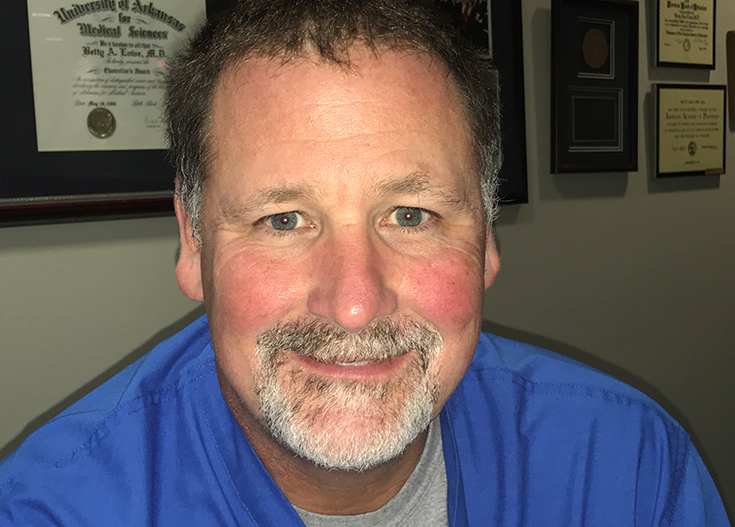
When RTs at Arkansas Children’s Hospital raised a question that couldn’t be easily answered, Randy Willis, MBA, RRT, RRT-NPS, AE-C, saw the opportunity to conduct a study. The abstract won him a spot in the prestigious Editors’ Choice session at the OPEN FORUM in Indianapolis in 2018. He talks about the study and his passion for research here —
Why did you decide to conduct the study, “Accuracy of Transcutaneous CO2 Values Compared to Arterial and Capillary Blood Gases”? What piqued your interest in this topic?
Our respiratory therapists with specialized neonatal expertise noticed a pattern of discrepancies between monitored vs. measured carbon dioxide levels in our NICU patient population.
Was this your first time conducting a research study? If not how many other studies have you conducted and where have you presented them or had them published?
I have been able to be a part of several projects over the past 10 years. Many of them have been published in RESPIRATORY CARE and presented in the OPEN FORUM at the AARC meetings.
What did you do to gain support from your organization to conduct this study?
We have developed a strong track record over the past years of developing and presenting quality improvement and research projects at local and national levels. Our ongoing goal each year is to present between 8-10 abstracts. We were able to show the hospital administration how important research was for evaluating practices and products. As a result of those discussions, the hospital funded a dedicated RT research position.
What were the biggest challenges you faced as you carried out the study and how did you overcome them?
Credit has to be given to the two NICU RTs who really dedicated themselves to this project. They worked as a team to meet the challenge of reviewing the needed data while still providing their usual high level of care to their patients.
How difficult was it to work the study into your normal job responsibilities and how did you alter your work routine to make it happen?
Again, two of our NICU core RTs did the majority of the work, especially with collecting the data. On occasion, they would come in early or stay over at the end of their shift to complete the data collection.
Do you think it was worth the time and effort?
Absolutely — anytime we can improve our patient care through evidence-based practice, the time and effort is well spent.
How did it feel to learn that your abstract had been accepted to the OPEN FORUM — and most especially, that it was selected for the Editors’ Choice session?
It was a great honor to be chosen to present at this venue. Anytime your work and efforts are recognized by your peers, it validates that it was all worth the effort of completing the project.
How do you think conducting a study like this and having it accepted to the OPEN FORUM is helping to further your career in respiratory care?
Participating in research is a great way to demonstrate commitment to professionalism. But just as importantly to me, is knowing that through research we are affecting the care of our patients at Arkansas Children’s, and that hopefully, through our presented research, we are doing our part to help improve patient care throughout the nation.
What advice do you have for other therapists who might like to follow in your footsteps but just don’t know how to get started?
Mentorship is crucial. The first step is to reach out to groups that are already doing research. Interdisciplinary work always enhances your product by providing different training perspectives to the research project. Always feel free to ask questions and have a questioning attitude. Also, don’t hesitate to reach out for advice or help.
Are you planning to conduct more studies in the future? If so, what will you study next and why?
Absolutely. We currently have several projects going on that cover a variety of different issues.
Thinking about conducting a research project of your own? The deadline to submit an abstract for the 2019 OPEN FORUM in New Orleans is June 1, so now’s a great time to start brainstorming ideas.
If you need a mentor to help get things started, join the Research Community on AARConnect and reach out for assistance. The community includes many veteran researchers who are willing to share their knowledge and expertise.





